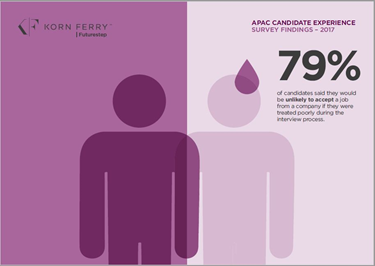Remember that candidates are consumers too
By Pip Eastman | Monday, 23 Apr 2018As consumers, it isn’t hard to recall times when we were let down by a service or a business. In fact, at one time or another, we’ve all probably promised to “never again” buy from a company after a particularly frustrating experience, and complained to our family, friends or colleagues about it.
We live in an era of the empowered connected consumer. The widespread use of social media, and a competitive business landscape means that every interaction between business and customer can have an impact on a company’s reputation, for better or worse. A positive experience yields loyalty and word of mouth, assets that are increasingly crucial to success. A bad experience, meanwhile, can have far-reaching consequences.
This principle of “customer experience” also extends to recruitment. Yet, despite knowing that people are the number one asset to any organisation, many recruiters and hiring managers fail to embrace the “candidate experience”.
A risky approach
In today’s environment, such an approach is risky. After all, candidates are not just future employees – they’re also consumers.
A recent survey conducted across the Asia-Pacific region by Futurestep, a division of Korn Ferry, sheds light on the importance of putting responsiveness, empathy and respect at the heart of the hiring process.
The findings revealed that 79 per cent of respondents are unlikely to accept a job offer if they were treated poorly during the recruitment process, regardless of whether they felt the role was a good fit. Just as notable was that only 14 per cent would remain a customer of a company if they had a bad experience as a candidate, with just over half (51 per cent) claiming that they would urge their family and friends to do the same. Twenty-seven per cent even said that they would take to social media to air their grievances about the recruitment process.

The respondents were also clear about what would frustrate them the most during the recruitment process. Close to half (44 per cent) of all respondents said that not hearing back from the recruiter or hiring manager would annoy them the most, while a third (32 per cent) cited people being rude during an interview.
Ensuring a positive candidate experience
These findings should give hiring managers and business leaders pause for thought.
With a multitude of cost-effective tools and resources at our disposal, there is absolutely no excuse for recruiters and hiring managers not to respond to candidates, at a bare minimum.
The key to candidate engagement, and nurturing a positive candidate experience, really boils down to two things.
The first is understanding that all candidates, whether or not they are successful, will share their experience with others. Making their journey a positive one, regardless of outcome, will promote the organisation’s employer brand. In fact, candidates who are positively engaged are more likely to reapply in the future or recommend others to consider applying.
The second vital thing is investing in effective communication, like recruitment-specific automation and artificial intelligence and, more importantly, through organisational design, structure and culture.
The importance of communication
For example, talent acquisition professionals should design and implement different levels of communication for candidates at different stages. This includes timely acknowledgements and notifications to reduce uncertainty and candidates’ waiting times. These can easily be achieved through recruitment technology such as an applicant tracking system, which dispatches automatically triggered emails to screen out and thank candidates should they not be invited to interview or not be accepted for the position.
They must also manage candidates’ expectations and timelines, including briefing them fully about the interview process and giving them advance notice. Respecting a candidate’s time and investment in the process is crucial.
An antiquated mindset
Too often, hiring managers see recruitment as a one-sided transaction, and do not value all candidates equally. This mindset is antiquated and shortsighted, especially in Hong Kong where there is a chronic shortage of talent in important sectors.
The evidence is clear: the rewards for treating candidates like a customer far outweigh the risks of treating candidates like a commodity, and HR professionals play a key role in educating hiring managers and other stakeholders to ensure they see the long-term value in doing so.

 How to maintain employer-of-choice standing with Hong Kong’s digital natives
How to maintain employer-of-choice standing with Hong Kong’s digital natives
 Youth Mobility Index 2018 provides a valuable trove of data and findings for HR to think, and act, on
Youth Mobility Index 2018 provides a valuable trove of data and findings for HR to think, and act, on